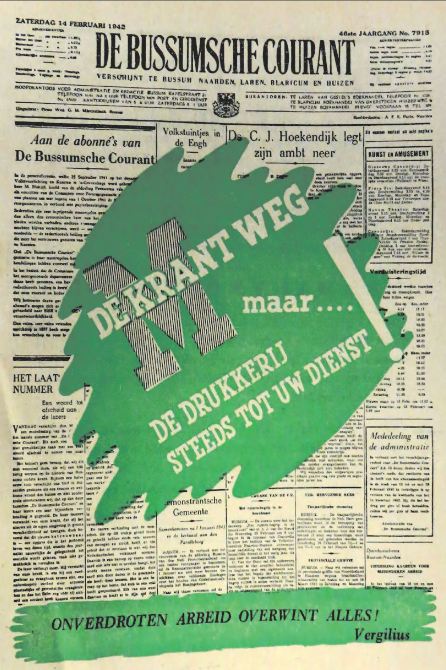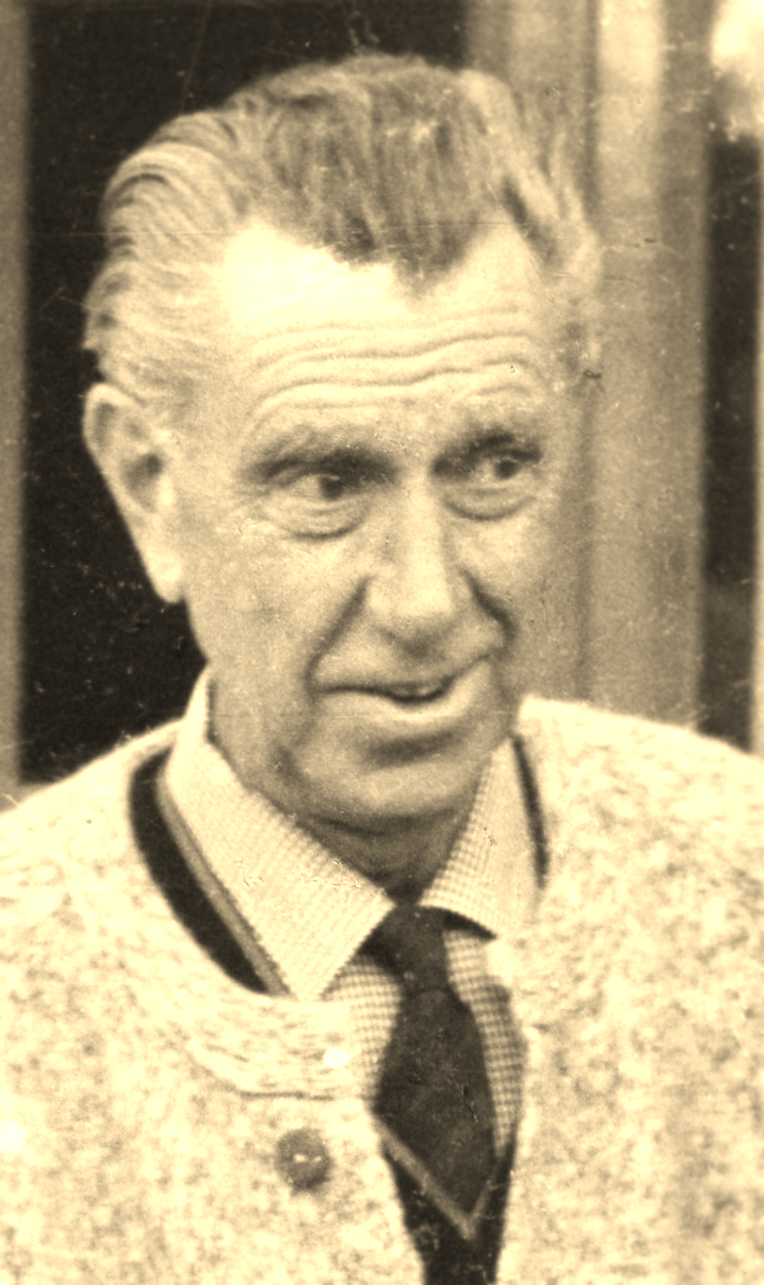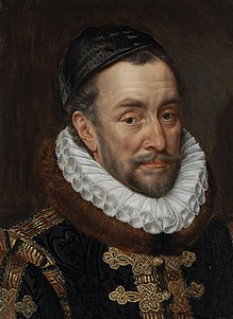
|
|
"HONOR and CONSCIENCE" 1
Picking up the thread from "1939: Gathering clouds": 3 The war lasted five days. The German occupation lasted five years, beginning on May 15, 1940. Within two weeks, Adriaan began to feel the impact of the Nazi regime on his newspaper, The Bussumsche Courant 5 Word had spread about members of the Dutch national-socialist movement (NSB) aiding and abetting the Germans in overrunning The Netherlands, news that the new regime wanted to squash. Editors were ordered to publish a denial of this fact and were further told not to publish that they had been ordered to do so. Thus began a control of the press by the Germans and their Dutch henchmen. 6 Adriaan's editor-in-chief, Anton Parée, managed to evade much of it; in fact resisted it. Case in point, during the occupation's early days, he published a review of a concert at someone's private home by a Jewish musician. Adriaan was fined a thousand guilders, which he never paid. 7 A year and a half into the German occupation, Adriaan was ordered to put editorial control of his newspaper in the hands of a Nazi fellow-traveller. He shut down the paper instead with a message on the front page of the paper's final issue, of February 14, 1942: 8 "During the press conference held on September 25, 1941 at the Department of Public Enlightenment and Arts in The Hague, the head of the Department's Section Media Affairs, Mr M. Blokzijl, in his function as chairman of the Commission for Media Reorganization, communicated plans to reorganize the Dutch media as of October 1, 1941; this in connection with economizing on paper. 9 "Since then radical measures have been put in effect that went beyond the purely economic aspect of the newspaper industry. A number of papers were prohibited from further publication, others were combined, but in so far newspapers were permitted to continue, their editorial policies—wherever The Hague it considered desirable—were altered and editors replaced by people who enjoyed a greater confidence within the Department of Public Enlightenment and Arts. 10 "De Bussumsche Courant, too, became affected by the measures taken by the Commission for Media Reorganization. Negotiations held in connection herewith did not lead to agreement. 11 "With respect to De Bussumsche Courant, the Commission for Reorganization, with the approval of the aforementioned Department, its continuation was made subject to replacing editorial control and henceforth we have to accept that further publication of our newspaper is prohibited. 12 "We regret this course of events for more than one reason, but our subscribers may be convinced that we acted with HONOR and CONSCIENCE in the full realization of our responsibility. 13 "We offer our heartfelt thanks to the many, very many friends DeBussumsche Courant has made for their friendship and their faithfulness since its establishment in 1897. 14 "The administration of De Bussumsche Courant Mr. Parée wrote another editorial, one stressing that the paper was Dutch and needed to be r e l i a b l e —that last word emphasized in the manner shown—not slanted by foreign influence. Through contacts in the underground resistance he later funneled food coupons for people hiding from the Nazi regime. 16 Naturally, some people berated Adriaan for publishing those editorials. They called him irresponsible, endangering his family. Sure enough, soon after, his home was surrounded by German troops and he was taken to The Hague where he was questioned and harangued by German officers in a room with mirrors and armed SS guards posted in the corners. He was threatened but in the end let go. When Adriaan was carted off to The Hague, his wife displayed the Dutch flag as a perilous act of defiance. 17 We do not know what precisely happened in The Hague because Adriaan was not a man given to much talking about his concerns. But, clearly, his life had been or still was in danger and his family's future precarious. All we know are bits and pieces, dots hard to connect. As for Blokzijl, the man in charge of media reorganization, he was a former chief editor of De Bussumsche Courant long before the war. Adriaan's survival may well have been due to a residual sense of loyalty on his part. Who knows? 18 The decision to shut down the paper hadn't come easily. A weighing of conflicing responsibilities—toward his wife and three daughters, towards his readers, towards people on his payroll—and with himself facing execution by the German invaders. And while all this was going on, the family's house had become a hiding place for Jewish people, but I'll save that for another story, to be told mostly by the daughter I married. The stress on his psyche must have been overwhelming. Adriaan turned to the Baptist church for spiritual sustenance and eventually had himslf baptized. His wife dutyfully followed suit, not without a grain of salt. 19 Adriaan's print shop continued to accept custom printing for enterprises and individuals. He fell into a trap a few months later, in May, when one of his personnel, probably unthinkingly, accepted the Dutch Nazi weekly, De Zwarte Sodaat ("The Soldier in Black") as a custom job. Upset as he became, there simply was no way out of it. I don't know the details of how he tried, I only learned that there were verbal confrontations, not only with the Dutch-run Media Affairs, but also with German authorities. He was told in no uncertain terms that the weekly would continue to be printed on his presses one way or another, the other being expropriation. I found on the internet that the printing was done by CV Märckelbach, "CV" stands for "limited partnership" by which he was not responsibe for the paper's content. 20 Let me interrupt this story with a little annecdote. A German officer had come to his place of work, presumably to size up the machinery, and when he tried to leave Adriaan's office he struggled with a door that had jammed. "A German officer who can't even open a door," Adriaan said, upon which the officer turned around, clicked his heels, raised his arm in the Hitler salute and said "We, German officers have opened all the doors in Europe," to which Adriaan replied, "Aren't you lucky." 21  Printing the Nazi weekly went soon elsewhere and an advertisement appeared in the print shop's window announcing "The paper gone, but the print shop remains at your service." The text, obviously referring to De Zwarte Soldaat, carefully overlaid the last issue of De Bussumsche Courant, Adriaan's editorial clearly visible. 22 In September 1942, printing of the paper went to L.E. Bosch & Zoon, in Utrecht. I can only imagine how the change came about. You see, soon after the invasion, the occupiers began requisitioning cars and motor cycles. Adriaan, instead of driving his Citroën automobile to where he was required to take it, arranged for replacing an essential part with a defective one. He had been assured that the defective item had become irreplaceable. And so ... connecting the dots .... But then, there might well have been some other reason. Who knows for sure? 23 Strengthening my feeling about the matter is the quote from Virgil at the bottom of the advert, "Onverdroten arbeid overwint alles" (Ardent labor conquers all), a somewhat faulty translation of Virgilius' "Labor omnia vicit improbus. For one, the word vicit is a perfect, hence it means "conquered" or "has conquered," not "conquers." Secondly, the word improbus has various meanings, each depending on context. "Ardent" fits the context of Vergilius' poem from which the quote has been taken. But in the present context, I suggest, improbus means "rebellious." Henceforth: "Rebellion overcame it all." Why the subterfuge? A brutal regime. 24 Figuring prominently in Dutch history is the eighty-year war (1568–1648), a rebellion of Dutch nobles and their following against Philip II, King of Spain, Lord of the Low Countries. Foremost among those nobles was William of Orange, "Father of the Fatherland." The first stanza of the Dutch anthem goes, translated from Middle Dutch: And so, dear reader, instead of rushing along as time flies, please slow down a while and think again! 26 * * *
Food had already become scarce by the fall of 1944, but things got drastically worse in the western part of The Netherlands when the supreme commander of the 25th Army, Christiansen, banned food transports by train to the urbanized west. This resulted in the death of 22000 people. Adriaan, who didn't have a strong physique to begin with, suffered from hunger endema and apathy. yet somehow, with the surrender of German to Allied forces, Fa. Wed. G.M. Märclbach came out with an issue celebrating the liberation. Its borders in the national colors: red, white, and blue. Its editorial: "Met volle kracht voorwaarts!" (With full force ahead!). 27 A day or so later there formed a lineup of people who wished to subscribe to the paper. Terminating De Bussumsche Courant in May 1942 and the advertisement shown above a few months later were evidence people went by. But nor they, nor even Adriaan's wife, knew all the facts. She used to fret about him regarding his business as his business, not hers. 28 The going-ons were interrupted by some official with an order to stop the proceeding because of that Nazi weekly printed by Märckelbach. According to my mother-in-law, it were a former editor of De Bussumsche along with a few others who were behind this turn of events. His companions urged Adriaan to simply go ahead anyway, but for him the order came as a final blow. He went home, spent two months in bed and remained for another two years under medical care because of a spot on a long. It was his wife who with the head of the technical part of the business carried on with the print shop and who arranged for a lawyer to represent him. However. he never even cared to defend himself and refused to even talk with the lawyer. 29 Hamstrung, the lawyer was bereft of the opportunity to mount a proper defense. One would think that any of his personnel responsible for operating or maintaining his presses should have been called as a witness or witnesses. To my knowledge that has not happened. Even with some Jewish people, who had found shelter in his home, testifying in his favor, the verdict was a long-term prohibition to publish the newspaper. Iustitia fugit. The time has since been shortened to five years. Adriaan's happiest days began in November of 1956 when at last he sold his business, reducing the sum he was offered to what he deemed the business was worth. 30
|
--
| top of page |
|


